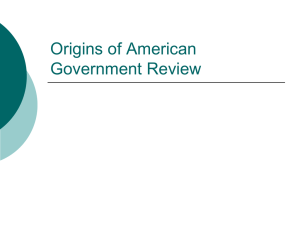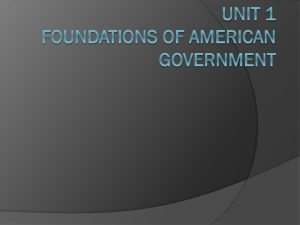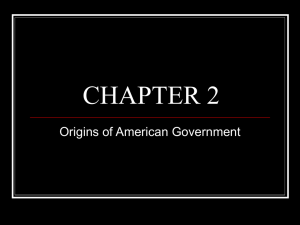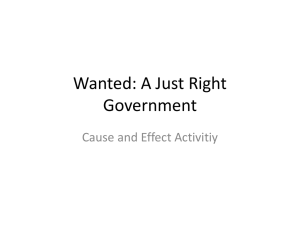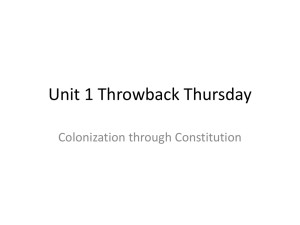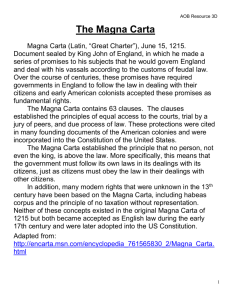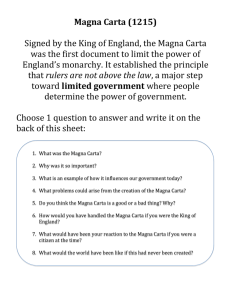Early Influences on the U.S. Constitution
advertisement
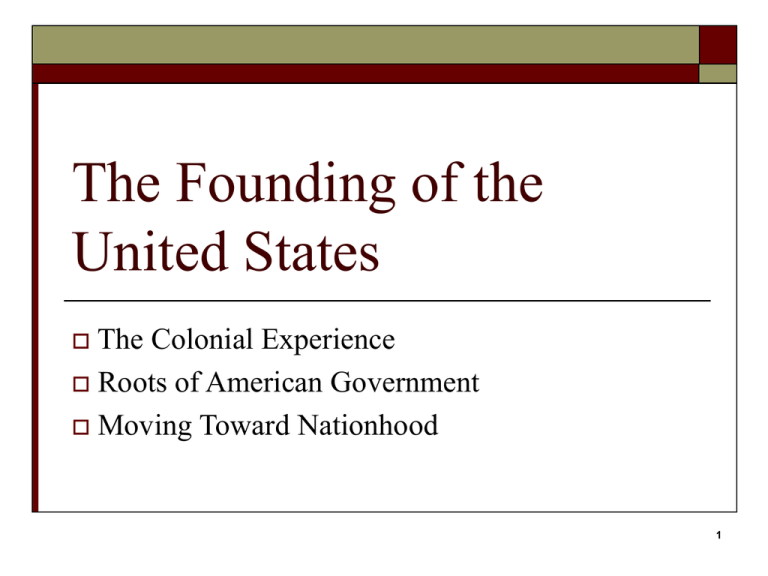
The Founding of the United States The Colonial Experience Roots of American Government Moving Toward Nationhood 1 The Colonial Experience – Vocab. Heritage: traditions passed down from generation to generation Legislature: a group of people elected to make laws Charter: a document giving permission to a group of people to start a government Tyranny: abuse of power 2 A Voice in Government Citizens of the colonies (called colonists) had a limited voice in government Each colony could elect its own legislature However, England had final authority over the colonies English Governors (chosen by King George) could reject laws passed the colonial legislatures 3 Citizenship in the Colonies Only white men who owned land were considered full citizens Only these people were allowed to vote Citizens in those days were expected to participate in government and promote the common good of society 4 Roots of Freedom – Religious Freedom Roger Williams founded The Colony of Rhode Island in 1636. He proclaimed Rhode Island to be a place where anybody could worship any religion they wanted. Soon other colonies followed his example in allowing of “religious freedom” However to many of the colonists religious freedom meant any kind of Christianity was acceptable, not other religions. 5 Roots of Freedom – Freedom of the Press Freedom of the Press – the right of newspapers to print the truth, even if it makes the government look bad – did not exist Zenger Case – early court trial won by colonist John Peter Zenger against the English Governor of New York. Zenger had printed an article accusing the governor of tyranny. The Zenger case inspired colonists to want freedom of the press 6 Roots of American Government Direct Democracy: a government where laws are made directly by the people Republic: A government where people elect people to make laws for them Natural Rights: Rights that no government should be able to take away (life, liberty, property/pursuit of happiness) Separation of Powers: Government power is divided into 3 branches (executive, legislative, judicial) so no branch become too powerful 7 Roots of American Government Each of the following contributed something to the ideas our founding fathers used in our Declaration of Independence and our Constitution! 1. Ancient Greece Ancient Rome Magna Carta English Bill of Rights John Locke & Montesquieu 2. 3. 4. 5. 8 Looking to Ancient Greece Ancient Greece Invented democracy – the idea that people should be able to control their government Direct Democracy was the kind of democracy that was used in Ancient Greece 9 Looking to Ancient Rome The Romans decided that direct democracy wouldn’t work when a country was too big They invented the republic – a government where people are elected to make laws for society 10 The English Tradition Originally the King ruled all. Over time the Magna Carta and the English Bill of Rights took power away from the King and gave it to the English people 11 Magna Carta First time King’s power was limited. This document limited the King’s Power and gave some rights to the nobles (rich people) Rights included the right to travel freely and the right to a fair trial 12 English Bill of Rights This document extended the rights in the Magna Carta to ALL English citizens (not just nobles) It also added some more rights: The King could no longer stop free speech in parliament and parliament had to approve of all tax increases. Parliament is England’s legislature. Our legislature is called CONGRESS 13 John Locke and Montesquieu The colonial leaders looked to great philosophers to help them decided what kind of government they should make John Locke provided the theory of natural rights. Montesquieu provided the theory of the separation of powers. 14 Quick Quiz 1. 2. 3. 4. 5. 6. What are natural rights? What is the Separation of Powers? What was the English Bill of Rights? What was the Magna Carta? Who is John Locke and what theory did he propose? Who was Montesquieu and what theory did he propose? 15 Moving Toward Nationhood Vocabulary Constitution: A plan for government. The rules for how a government works. Ratification: Agreement to something or approval of something 16 England vs. The Colonies Many colonists started to become more and more frustrated with their treatment under English rule Unfairly imposed and high taxes Unreasonable searches in homes England only let the colonies trade with England Not full freedom of the press and speech 17 No Taxation without Representation Parliament (The English legislature) had to pay off war debt and raised trade taxes on the colonies. Colonists were furious: Why should they be taxed by a parliament in which they had no representation? “No taxation without representation” became a battle cry for independence. 18 Declaration of Independence In the Second Continental Congress (gathering of representatives from all colonies) the representatives voted for independence. Some colonists were afraid of independence The representatives wrote the declaration to explain to ALL why the United States should be free! 19 Organizing a New Government The Colonies became the States. Each State had their own State Constitution The Country needed a constitution for the national government In 1777 the Continental Congress (the temporary national government) created the Articles of Confederation 20 Articles of Confederation The U.S.’s first National Constitution Only created one branch of government (legislative) Created a very weak national government The government couldn’t settle disputes (problems) between the states The government had no taxing authority over the states The government had no ability to make treaties or deal with foreign countries in a unified voice 21 The Constitution of the U.S. Because the Articles of Confederation… were too weak for the national gov. to function many leaders came together to make a new constitution. They called it… The Constitution of the United States of America It called for three branches each containing its own powers with ways to balance the powers of the other two branches and a bill of rights protect citizens from specific government tyranny! 22 Constitution of the United States 23 Quick Quiz 1. 2. 3. 4. 5. 6. What was the Declaration of Independence? What was the Articles of Confederation? Why was it weak? What were some reasons the colonists were frustrated? What are the three branches of government and what does each one do? What does our constitution have to protect citizens from government tyranny? 24


